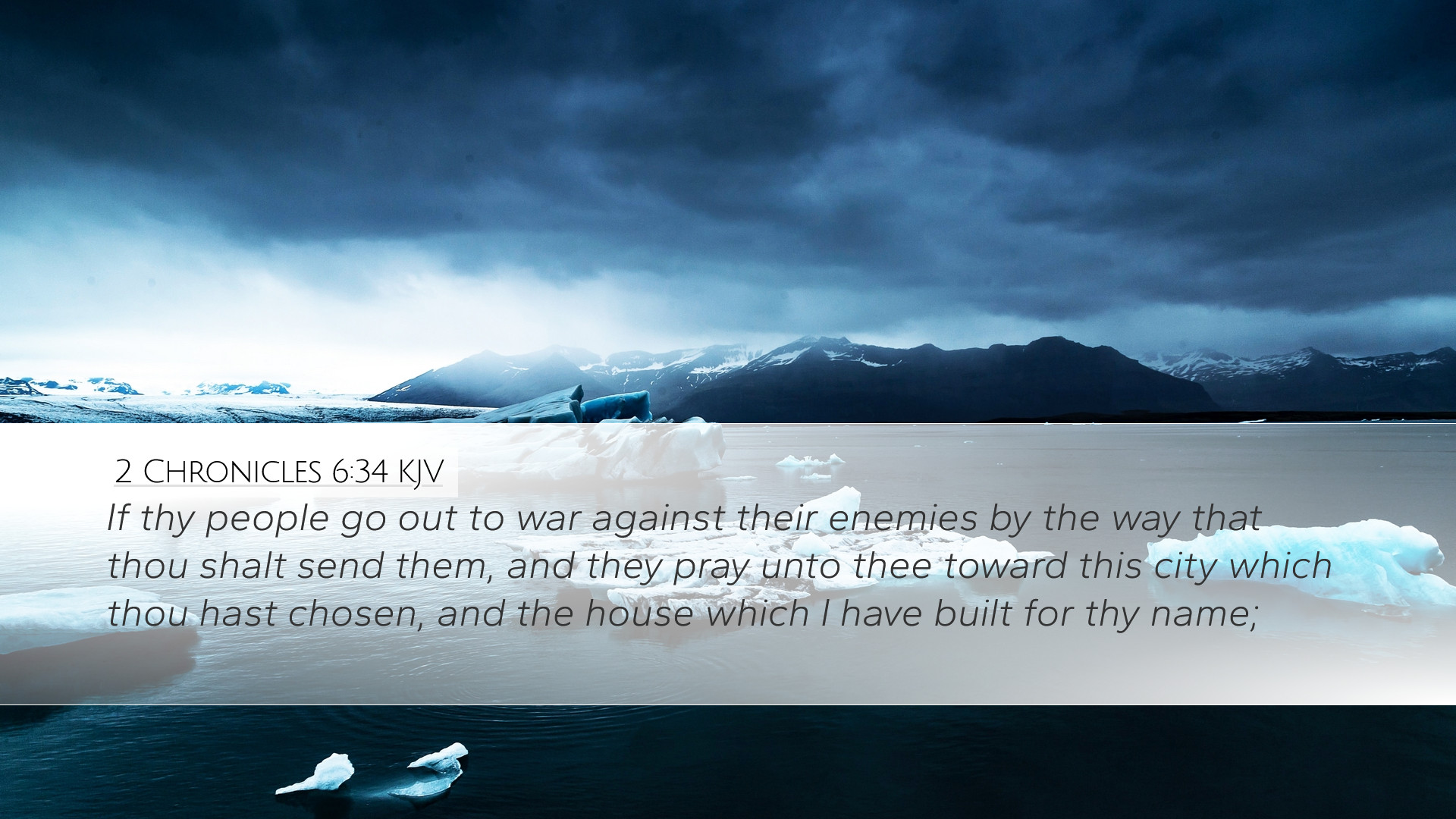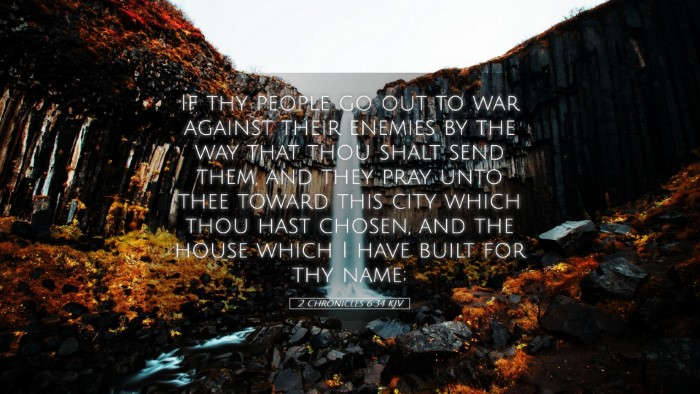Commentary on 2 Chronicles 6:34
Verse Interpretation: "If thy people go out to war against their enemies by the way that thou shalt send them, and they pray unto thee toward this city which thou hast chosen, and the house which I have built for thy name."
General Context
The passage in 2 Chronicles 6:34 occurs within Solomon’s dedicatory prayer for the temple, a significant moment in the history of Israel. This chapter elaborates on themes of devotion, divine guidance, and the relationship between God and His people.
The temple symbolizes a physical dwelling for God among His people, emphasizing the importance of prayer and reliance on divine support in times of conflict. The context underscores the foundational understanding that victory in war is contingent not solely on human effort but on divine favor.
Insights from Matthew Henry
Matthew Henry emphasizes the critical aspect of prayer during warfare. He notes that the people of Israel were not to act presumptuously, relying on their prowess alone. Instead, their strength in conflict derives from a humble acknowledgment of God’s sovereignty. Solomon’s prayer directs their focus towards God as the ultimate source of victory.
Henry also points out that the phrase “toward this city” signifies the need for a physical and spiritual direction in prayer, indicating that prayer is not only an inward act but an act of submission and reverence towards God's chosen place. The temple represents the manifestation of God’s presence, thus prayer directed towards it symbolizes dependence on divine assistance.
Insights from Albert Barnes
Albert Barnes draws attention to the procedural nature of the request made by Solomon. Barnes elaborates on the necessity for the people to approach God with an expectation of His intervention in their conflicts. This meticulous approach illustrates the role of collective prayer as a formalized means of seeking God’s support.
Additionally, he emphasizes that the notion of "the house which I have built for thy name" reinforces the relationship between worship and warfare. The temple is not merely a physical structure but a spiritual emblem binding the people to their covenant with God. When they direct their prayers toward it in times of distress, they reaffirm their trust and fidelity to God’s purposes.
Insights from Adam Clarke
Adam Clarke provides a deeper theological exploration, suggesting that the mention of “enemies” distinguishes between those adversaries that arise due to righteousness and those from unjust assertions. Clarke posits that this prayer serves as a representation of just warfare—a notion critical for understanding the responsibilities of believers during conflicts.
Clarke delves into the expectation of divine involvement in Israel's battles, explaining that the focus on the temple as a sacred location demonstrates the heartfelt acknowledgment of divine authority over their endeavors. The temple serves as a reminder to maintain purity and righteousness in all dealings, both with God and fellow humans.
Theological Reflections
This verse encapsulates a profound theological principle that God’s guidance is essential in every aspect of life, especially in times of turmoil. It invites believers to reflect on the posture of their hearts when approaching God. Prayer is both a shield and a weapon in the believer's arsenal against spiritual and physical adversities.
The emphasis on God's active role in human affairs encourages pastors and theologians to consider how prayers are framed within their communities. Are congregations approaching God with the faith that He hears, acts, and responds? The expectation inherent in Solomon's prayer illustrates that reliance on God is paramount for communities facing external threats.
Practical Applications
- Encouragement of Prayer: Pastors should encourage prayer not just as a ritual, but as a fundamental reliance on God’s power in every circumstance.
- Collective Worship: The community should be invited to engage in unified prayer, particularly in times of communal distress or conflict, recognizing their dependence on divine intervention.
- Teaching on Divine Sovereignty: Educators in church settings should instill an understanding of God’s sovereignty in their teachings, linking the practices of prayer to theological truths about God’s involvement in human affairs.
- Preparation for Conflict: When facing trials, congregants should be reminded of the necessity of seeking God’s guidance first, framing their battles within a context of divine purpose.
- Spiritual Direction: Churches should provide guidance on how to direct prayers toward God effectively, delineating how prayer can be both personal and corporate as a means of accessing God’s will.
Conclusion
In summary, 2 Chronicles 6:34 serves as a rich source of theological insight and practical application for believers. The commentary from Matthew Henry, Albert Barnes, and Adam Clarke collectively calls believers to a deeper understanding of reliance on God, particularly during times of conflict. It challenges us to nurture a culture of prayer that acknowledges God’s sovereignty, prompting both the individual and the community to seek divine guidance and intervention diligently. This verse remains pertinent, emphasizing that sincere prayer towards God is integral to achieving victory against adversaries, translating spiritual truth into actionable faith.


